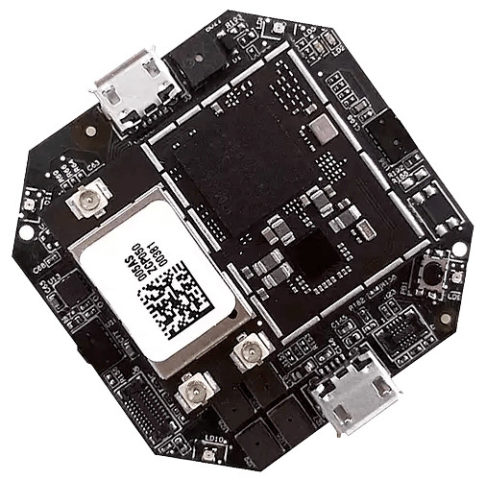Samsung first announced their Artik IoT modules almost three years ago, and until recently most Artik related products or development kits came from Samsung themselves, with no third party involved. But this has started to change recently with announcements such a Seeed Studio Eagleye 530s low cost development board based on Artik 530 module, and Resin.io Project Fin combining RPI CM3L module with an Artik 020 module for low power Bluetooth connectivity.
But as I flicked through Resin.io supported hardware, I discovered they also supported Linux powered Artik 520 and Artik1020 module, as well as some new “KITRA” boards I had never heard of, and if we visit RushUp company website, we can see they have a bunch of Kutra boards and one IoT gateway based on Artik modules:
- KITRA 520 – Samsung ARTIK 520 product accelerator for advanced IoT
- KITRA 710 – Samsung ARTIK 710 product accelerator for advanced multimedia and industrial I/O
- KITRA 710C / Kitra 530 – Samsung ARTIK 710C and 530 product accelerator for industry 4.0 and IoT
- KITRA 020L – Product accelerator for IoT nodes based on Sigfox/LoRa, BLE with sensors
- KITRA GTI – Samsung ARTIK 710 based Industrial IoT gateway with optional LTE modem, and plastic or rugged aluminum enclosure
I’ll go through Kitra 530 / Kitra 710C and Kitra 020L models in this post to get a better idea of what the company has to offer.
KITRA 530 / KITRA 710C
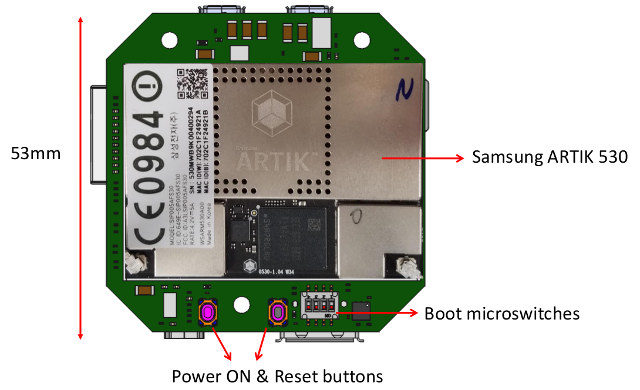
KITRA 530 / KITRA 710C specifications:
- IoT module
- Kitra 530 – Samsung ARTIK 530 with S5P4418 quad core Cortex A9 processor @ 1.2GHz, Arm Mali GPU, 512MB RAM, 4GB eMMC flash, and wireless connectivity (see below)
- Kitra 710C – Samsung ARTIK 710 with S5P6818 octa-core Cortex-A53 processor, Arm Mali GPU, 1GB RAM, 4GB eMMC flash, and wireless connectivity
- Storage – micro SD card
- Video Output – micro HDMI connector
- Connectivity – 10/100Mbps Ethernet, dual band Wi-Fi, Bluetooth, ZigBee, and Thread
- USB – 1x USB type A host port, 1x micro USB OTG port, 1x Micro USB for Samsung ARTIK debug
- Sensors – Barometric pressure sensor, accelerometer & gyroscope, accelerometer & magnetometer, proximity sensor with 2 meters range (VL53L0X)
- Expansion – Ten poles Pico-blade connector for analog inputs, PWM output, I2C, UART, 3,3V
- Misc – RGB LED
- Power Supply – 12V via standard 5.5mm jack
- Dimensions – 53x53mm
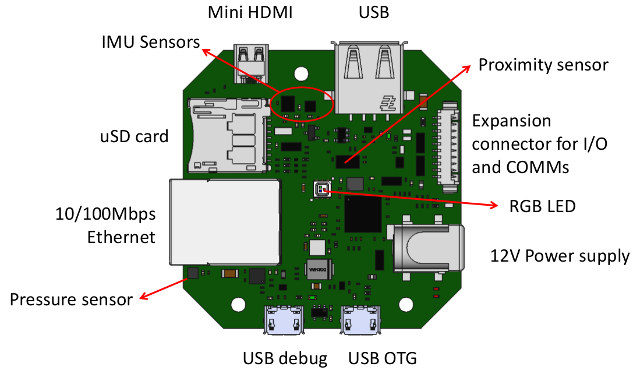
The board supports “enterprise-class security with hardware secure element and Secure OS”, as well as “Fedora Linux packages with multimedia, connectivity, graphics, power management and security libraries”. Samsung has recently switch to Ubuntu for their Artik modules, so maybe this information is not up-to-date, and the Wiki on Github shows how to install ResinOS, so there should be multiple options. The Linux kernel source code is based Linux 4.4.71.
KITRA 020L
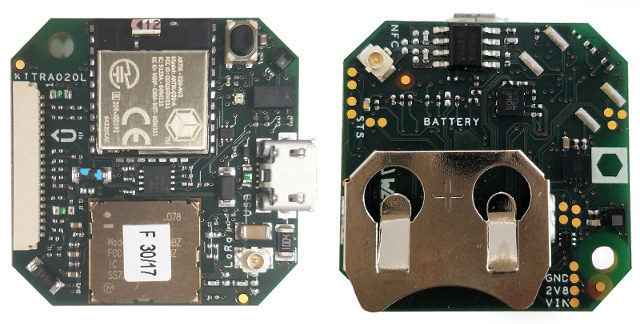
While other KITRA boards are all running Linux, and suitable as gateways, KITRA 020L can be used as battery powered end node that communicates with KITRA based gateway, or a Sigfox/LoRa gateway.
KITRA 020L specifications:
- IoT Module – Artik 020 with Arm Cortex-M4 core at 40MHz, 256 kB flash
32 kB RAM, hardware crypto accelerator and RNG (Random number generator), Bluetooth - Connectivity
- Bluetooth 4.2 with 200 meter range (Artik 020 module)
- Murata CMWX1ZZABZ-078 LPWAN module for Sigfox or LoRaWAN (based on STM32L082 and SX1276)
- 4-Kbit Dynamic NFC / RFIDtag with uFL connector for external antenna
- Sensors – Temperature & humidity sensors, accelerometers and gyroscopes, 2 meters proximity sensor (VL53L0X)
- Expansion – Connector for power supply, analog inputs or GPIO, UART and debug JTAGs.
- Misc – RGB LED, user button
- Power supply – 5V from USB or expansion connector or CR2032 battery
- Dimensions – 32x32mm
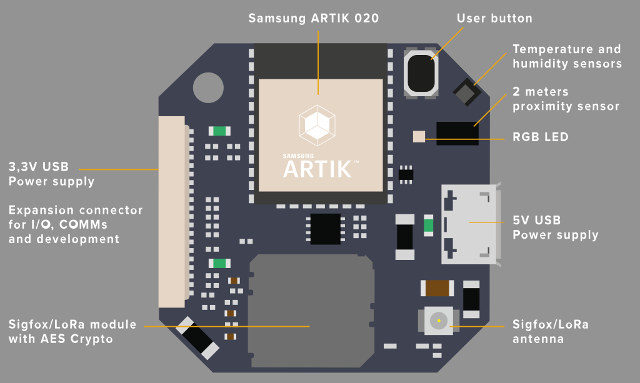
You’ll find some documentation on Github too, but limited to hardware, so for software support you may have to check out Samsung Artik 020 documentation instead.
The company does not have a shop for their products, and but they sell their Kitra boards through distributors such as Mouser or Digikey. KITRA 020L sells for $89, KITRA 520 for $199, and KITRA 710C for $198. I could not find pricing for other variants like KITRA 530 or KITRA GTI.

Jean-Luc started CNX Software in 2010 as a part-time endeavor, before quitting his job as a software engineering manager, and starting to write daily news, and reviews full time later in 2011.
Support CNX Software! Donate via cryptocurrencies, become a Patron on Patreon, or purchase goods on Amazon or Aliexpress


